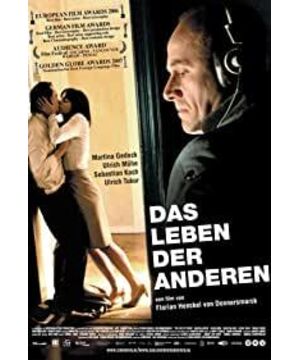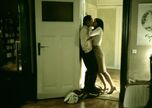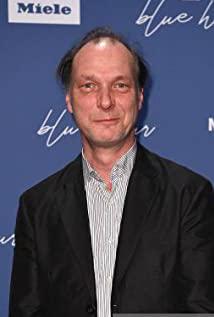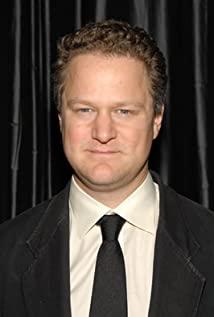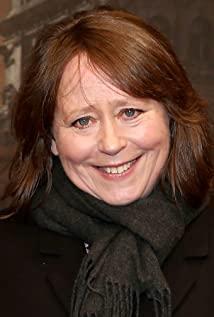An East German secret police decides to eavesdrop on a famous writer. Partly for his own future and part, I think, he fell in love with the writer's beautiful wife, East Germany's most famous actor, after that show.
The writer has many friends, all of whom are "rightists" who yearn for freedom. Relatively speaking, this writer is the mildest of them all. He doesn't quite know what the ban means. He thinks that friends should not be too aggressive or too conspicuous, but should be cautious and protect themselves. Even turned on his best friend for that, because that was a radical radical.
A secret police searched the writer's home and took away from his desk a collection of poems that had just been published. The narration is the beautiful verse in the poetry collection "those young upright trees reaching for the sky, like love they flourished and grew...and with faith in your heart, it shall never leave you", and the policeman's soft eyes are in the camera. He has come to understand and love this writer and his life a little bit. In the next scene, the writer's friend, a director, commits suicide due to a long prison sentence. When the writer got the call, he just said, "I'm sad too." He walked to the piano and played a piece called "Smile". His beautiful wife, standing quietly behind him, put her hands on his shoulders. He said that if he was alive, he would know what I wanted to say. As soon as the camera turned, it was the shocked expression of the secret police. I think, from that moment on, his balance was completely tilted.
The director's death touched the author, and he found a friend and asked him to help publish an article on the number of suicides in East Germany. During the preparation, they wanted to test whether their house was being monitored, but the police saw through the trick and were not fooled. So they feel at ease in the room to create, read aloud. The police were supposed to report their behavior, but the attitude of his superiors made him realize the terrible system, so he turned to saying that he would fire his assistant and monitor himself. A beautiful guitar flow, the writer typing, reading the script, and interweaving with the police listening report. Writers typed shocking numbers on the typewriter, while the police typed out a series of lies that "they discussed the 40th National Day repertoire...they thought the characters were the focus...they were tired from discussing and resting...". Eventually, the article was published in West Germany, and East Germany was shocked.
Then comes the climax of the film. The government searched the micro-printer used to print the article, but ended in vain because of its secrecy. They took the writer's wife and sent the surveillance secret police to interrogate him because of his superb interrogation skills. The actor finally explained that when the searcher arrived at his house and opened the floor, she couldn't face her husband's eyes, rushed out of the house and crashed into a passing bus.
The secret police rushed over and said in a panic, "Don't die, I have already hidden the printer... The
writer ran over, hugged her tightly, and said in vain, "Forgive me, forgive me, forgive me..."
But She still died, leaving behind sad people and a very sad husband.
As a result of the failure of the mission, the secret police were called to dismantle letters for punishment, the lowest level of work, for a period of twenty years.
Four years later, the Berlin Wall fell.
The writer stumbles across the former Minister of Culture and learns that he, too, has been tapped. He went to check the archives of that year and was amazed at the record made by the secret police during the writing of the article, "What the hell is going on..." Until he turned to the end of the record, the page said, "The surveillance is over, HGW" XX/7. Next to it is a red blot, rubbed by a finger stained with red ink. And this red ink is exactly the ink used by the writer's micro-printer.
Everything is finally explained.
He found XX/7 who delivered the letter on the street, looked at it for a long time, and left.
Two years later, he published a book "the sonata from good men". When the secret police saw that it was the author, they went to the bookstore and flipped through the book, which read, "dedicated to HGW XX/7". He bought the book for himself.
At the end of the film, it is his happy eyes.
I love this movie because of the story, the way it's told, the music, and the amazing performances by the actors.
I am fascinated by stories of a man finding his inner direction in an uncontrollable torrent. There is some historical heaviness in the story, some pain and sadness, originating from the system or people's hearts, while more, it is reflection, redemption, victory and light. Even if "someone dies before dawn," as long as we do the right things, there will be bright results. And this kind of real sadness and joy is more like life itself, and only has deep thinking and moving.
Good stories always come out of extreme environments, magnifying everything, strong conflicts and unavoidable choices, but more and more people's fear, cowardice, ideals, beliefs, courage, and many, many more.
Different from the avant-garde experiment of "Lola Run", "Goodbye Lenin" is unrestrained. In this minimalist lens, more is expressed through the actors' performances, close-ups, and music.
For example, at the beginning of the show, the secret police went to the show, a close-up of an actress, a close-up of a policeman holding a telescope, and music full of repressed emotions, we know that he fell in love with the actor, and then there is a future story. .
That secret policeman appeared at first with an absolutely rational, even ruthless face. And when you watch it, you suddenly realize that it was his perfect performance that propped up this movie. His moving and longing eyes when he looked at lazlo's (writer) poetry collection, his absent-minded eyes when he listened to lazlo playing the piano, his firm and fearless eyes when he made up those stories, and his regretless and calm eyes when he was sent to open letters, and the last look The gratified eyes when I arrive at Lazlo's works are so in place and convincing. We see a man blinded by the enterprise of wiretapping and surveillance, a complete machine, re-seeing another beauty in life and betting his entire career on it.
Why is this cop changing? The first trigger must be the actress, a machine with feelings is always dangerous, like leon. When he finds out that there are other possibilities in life besides what he has always believed in, he will look for this possibility. He takes the writer's poetry collection and hears the writer's violin, and he finds out that it turns out that he can read it by himself. People who are enemies have such wonderful existences in their ordinary lives. And his decisive courage and wisdom have made him such a beautiful being, which is why I say, this is a story about people who are lost in the system and find themselves and redeem themselves.
I really liked the episode when the writer wrote the article, Stell Dich mitten in den Regen, full of touches and hope that will never give up.
Stell dich mitten in den Regen,
glaub an seinen Tropfen Segen.
Spinn dich in das Rauschen ein
und versuche gut zu sein.
Stell dich mitten in den Wind
glaub an ihn und sei ein Kind.
Lass den Sturm in dich hinein
und versuche gut zu sein .
Stell dich mitten in das Feuer,
glaub an dieses Ungeheuer
in des Herzens rotem Wein
und versuche gut zu sein.
View more about The Lives of Others reviews


